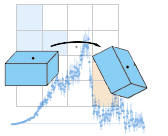
| HOME | PEOPLE | RESEARCH | ACADEMICS | TRAVEL/VISITORS | LINKS | CONTACT |

|
Web Mail
Mailing Lists
Computing Resources
Site Map
Robust Identification of LPV Systems with Applications to Active Vision
Prof. Mario Sznaier, Pennsylvania State University, Department of Electrical Engineering
Monday, January 29, 200111:00 AM to 12:00 PM
Steele 102
During the past few years considerably attention has been devoted to the problem of synthesizing controllers for Linear Parameter Varying Systems, where the state-space matrices of the plant depend on time-varying parameters whose values are not known a priori, but can be measured by the controller. Assuming that bounds on both the parameter values and their rate of change are known then Affine Matrix Inequalities based conditions are available guaranteeing exponential stability of the system. Moreover, these conditions can be easily used to synthesize stabilizing controllers guaranteeing worst case performance bounds (for instance in an ${\cal H}_2$ or ${\cal H}_\infty$) sense. These results formalize the intuitively appealing idea of gain scheduling, while avoiding its pitfalls.
Clearly, a key issue that needs to be addressed in order to apply these techniques to practical problems is the development of identification methods capable of extracting the appropriate description from experimental data. Control oriented identification of LTI systems is by now relatively mature, and efficient algorithms are available to obtain both models and worst case bounds on the identification error. On the other hand, identification tools for LPV systems are just starting to appear.
In this talk we will present a new framework for robust identification and model (in) invalidation of LPV systems. The main result shows that the problems of (i) obtaining a nominal model and bounds on the identification error; and (ii) invalidating a given uncertainty description, can be recast as LMI feasibility problems. Moreover, the overall computational complexity of these problems is similar to that of identifying or validating LTI models of comparable size.
These results will be illustrated with a practical example arising in the context of active vision.
|
©2003-2011 California Institute of Technology. All Rights Reserved webmaster |
|